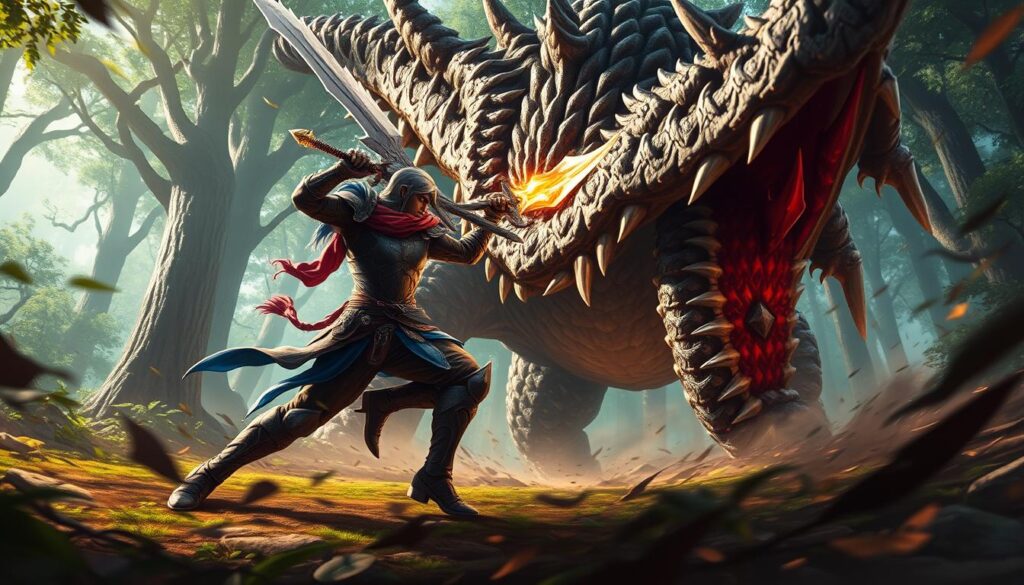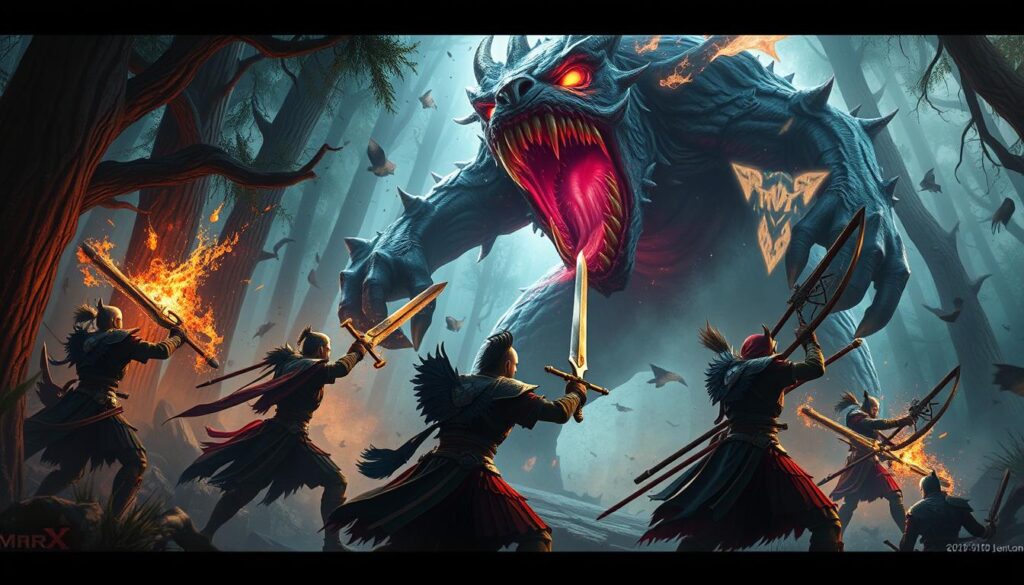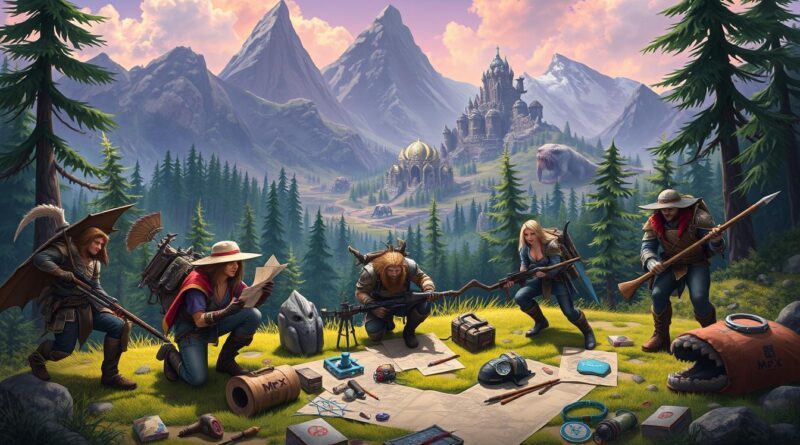Monster Hunter Tips and Tricks: Essential Guide for Success
Have you ever felt the rush of excitement when you step into a vast, unknown territory? You’re armed with nothing but your wits and a sharpened blade. Every rustle in the bushes could signal a mighty beast ready to test your skills.
This is the essence of Monster Hunter. Mastery requires not just courage, but a set of finely honed techniques. Expert strategies are the keys to success, allowing you to conquer every quest and emerge victorious. Dive into this guide, filled with monster hunter tips and tricks that will equip you to face even the fiercest creatures head-on.
Key Takeaways
- Understanding monster ecology is crucial for strategic hunting.
- Preparation is essential to maximizing your hunting success.
- Know your weapon choices and their impact in battle.
- Identify and exploit monster weaknesses effectively.
- Coordination with teammates can turn the tide of a hunt.
- Learn from veterans to avoid common pitfalls.
Introduction to Monster Hunter
The Monster Hunter franchise has been thrilling players since it started. It mixes exciting gameplay with rich environments. Players face off against big monsters in different settings, like forests and deserts.
This series has introduced many new features over the years. It keeps the game exciting while staying true to its roots. New weapons, armor, and monster behaviors are added, attracting both new and seasoned players. The core idea of hunting, tracking, and battling big creatures is key to enjoying the game.
Understanding Monster Ecology and Behavior
Exploring monster ecology shows how different species interact with their environments. Each monster behaves uniquely in its ecosystem. Knowing these behaviors is key for hunters to improve their tactics.
Many things affect monster behavior, like terrain, weather, and resources. Watching how these factors change a monster’s actions can be very helpful. For example, some monsters love dense forests, while others prefer open plains. Learning these preferences helps hunters guess where to find them.
Knowing specific monster behavior patterns makes hunting better. For instance, knowing when monsters mate can lead to more successful hunts. By tracking seasonal changes and how monsters react to their environment, hunters can get better at their job.
| Monster Type | Preferred Habitat | Behavioral Traits |
|---|---|---|
| Forest Dweller | Dense Forests | Stealthy, Ambush Predator |
| Plains Roamer | Open Plains | Curious, Fast Movers |
| Mountain Beast | High Altitudes | Aggressive, Territorial |
By learning about monster ecology and behavior, hunters can do better. They can adapt to the challenges of different ecosystems. Knowing more about monsters and their homes helps hunters succeed.
Essential Monster Hunter Tips and Tricks
Being prepared is key to success in monster hunting. The right gear and efficient inventory management are crucial. Knowing your target’s habits helps you develop effective strategies. This way, you can not only survive but also thrive in the monster hunting world.
Preparation is Key
Before you go on a hunt, make sure you have all the essentials. Here are some important preparation tips to keep in mind:
- Choose weapons that fit your style and the monster’s type.
- Carry health items, traps, and elemental bombs.
- Bring items for environmental benefits, like camouflage.
- Keep your inventory organized for quick access during fights.
Study Your Target’s Habits
Understanding the monster’s behavior is crucial. By studying target habits, you can plan your attacks more effectively:
- Watch their movement patterns to guess their next move.
- Learn their attack styles to dodge better.
- Find their weaknesses and plan your attacks around them.
- Know when they retreat, which might be a good time to attack.
| Preparation Tips | Impact |
|---|---|
| Choose the right weapon | Increases damage output |
| Stock health items | Improves survival chances |
| Use traps effectively | Helps control monster behavior |
| Study monster behaviors | Enhances strategy formulation |
Mastering Combat Mechanics
Effective combat in Monster Hunter series depends on knowing combat mechanics. Players can pick from many weapon options, each suited for different playstyles. Understanding each weapon’s strengths and weaknesses helps players choose the right one for their hunts.
Weapon Choices
When picking a weapon, think about its unique mechanics and what you like in combat. Here’s a look at some popular choices:
| Weapon Type | Strengths | Weaknesses |
|---|---|---|
| Sword and Shield | Balanced attack and defense, quick movements. | Lower damage output compared to heavier weapons. |
| Great Sword | High damage potential, capable of staggering monsters. | Slow attack speed, requires precise timing. |
| Bow | Long-range attacks, versatile with different ammo types. | Lower damage in close combat situations. |
| Hammer | Excellent for stun damage, good against many monster threats. | Poor mobility when charging attacks. |
Combat Techniques for Beginners
For new players, learning basic tactics can make hunting better. Here are some key techniques:
- Dodge Timing: It’s key to dodge attacks well. Use the roll mechanic to dodge and move safely.
- Target Weak Points: Hit monster weak spots for more damage. Learn monster anatomy for better aim.
- Utilize Items: Always have potions and traps ready. Knowing when to use them can help in tough fights.
- Practice Combination Attacks: Knowing basic combos can boost your skills. Try different attacks to find what works best.

By mastering the right weapons and tactics, players can become more confident and effective. This leads to successful hunts in Monster Hunter.
Optimizing Gear and Equipment
In Monster Hunter, the right gear can make a big difference. Choosing the best armor and upgrading your weapons is key. These choices affect how well you do in battles.
Choosing the Right Armor
Different armor sets offer unique benefits. Look for armor that matches your playstyle and weapon choice. Here are important things to think about:
- Defensive Value: Higher defense means less damage taken.
- Skill Bonuses: Some armors boost specific weapons.
- Elemental Resistances: Choose armor that resists monster elements.
Try different armor combinations to find the best mix. The right armor keeps you safe and boosts your hunting skills.
Upgrading Weapons Effectively
Upgrading your weapons is crucial as you play more. To deal more damage, focus on these steps:
- Gather the Required Materials: Collect resources from monsters and the environment.
- Focus on Specific Attributes: Choose to improve raw damage, elemental power, or afflictions.
- Utilize Upgrade Trees: Follow your weapon’s upgrade path for the best enhancements.
Understand how each upgrade affects your weapon. Knowing this helps you optimize your gear for better performance against tough monsters.
| Armor Type | Primary Skills | Elemental Resistance | Overall Defense |
|---|---|---|---|
| Heavy Armor | High Defense, Health Boost | Fire, Ice | 250 |
| Medium Armor | Agility, Stamina Boost | Thunder, Water | 150 |
| Light Armor | Speed, Evasion Boost | Dragon, Poison | 100 |
Monster Weaknesses and Vulnerabilities
Knowing how to find monster weaknesses is key for hunters. Spotting and using these weaknesses can greatly change battle outcomes. This part talks about finding those weak spots and using elemental damage to fight better.
Identifying Weak Points
Monsters have certain weak spots in every fight. These can be specific body parts or behaviors that show when they’re most vulnerable. Watching how a monster moves or looks tired can give you clues. Here are some ways to find these weak points:
- Watch the monster’s attack animations for clues about openings.
- Use scouting tools or traps to gather intel on their behavior.
- Engage with fellow hunters to share insights about particular monsters’ vulnerabilities.
Utilizing Elemental Damage
Using elemental damage like fire, water, thunder, and ice can really help you fight tough monsters. Each monster takes different amounts of damage from each element. It’s important to know how each element affects them. For example:
| Monster Type | Fire Damage | Water Damage | Thunder Damage | Ice Damage |
|---|---|---|---|---|
| Brute Wyvern | High | Medium | Low | Medium |
| Aerial Monster | Medium | High | Medium | Low |
| Elemental Beast | Low | Medium | High | Medium |
Monster Hunting Strategies
Effective monster hunting needs a good plan and tracking skills. A solid strategy boosts your chances of success and makes hunting fun. Being well-prepared saves time and resources, making each hunt more effective.
Planning Your Hunt
Planning your hunt is key. Begin by researching the monster you want to hunt. Learn about its habitat, behavior, and weaknesses. Scouting the area helps you understand the environment.
Having clear goals, like hunting a specific monster or gathering certain resources, keeps you focused.
- Conduct pre-hunt research on monster behavior.
- Scout potential hunting locations for environmental advantages.
- Establish clear hunting objectives.
Tracking Monsters in the Field
In the field, tracking is essential. Use tools like your map and scouting gadgets to find monsters quickly. Look for signs like tracks, droppings, and sounds. These clues help you track the monster efficiently.
| Tracking Techniques | Description |
|---|---|
| Footprints | Look for footprints to determine the recent activity of the monster. |
| Sound Cues | Listen for growls, roars, or other noises that indicate the presence of a monster. |
| Visual Signs | Spot broken branches or disturbed vegetation to assess the monster’s path. |
Defeating Powerful Monsters
Facing powerful monsters needs careful planning and strategy. Success depends on managing resources well. Knowing how to gather resources and communicate with your team are key to beating these tough foes.
Gathering Resources and Items
Getting the right supplies is crucial for defeating monsters. Good resource management includes:
- Collecting crafting materials: Gather items for weapon upgrades and potions.
- Stocking necessary items: Have lots of healing items and buffs ready.
- Strategically planning resource acquisitions: Use quests and expeditions to stock up before the fight.
Coordinating with Your Team
Beating tough monsters often requires teamwork. Good coordination among team members makes a big difference. Here are some teamwork tips:
- Assign roles: Give each team member a specific role, like attacker, support, or tank.
- Communicate actively: Share info on monster movements, health, and inventory to stay in sync.
- Stay mobile: Moving together can dodge monster attacks and set up counterattacks.

By managing resources well and working together, defeating powerful monsters becomes easier and more rewarding.
Multiplayer Co-op Tactics
Success in Monster Hunter depends on teamwork. Good team communication and knowing each other’s roles are key. By using co-op strategies that fit your team’s strengths, you can do better in hunts.
Communicating Effectively
Good communication is the heart of teamwork in Monster Hunter. Use voice chat or in-game messages to share important info. This way, everyone knows what’s happening and can act fast. Here are some tips to improve communication:
- Speak clearly and briefly to share updates quickly.
- Choose a leader to plan and signal attacks.
- Check in regularly to see who’s where and what’s needed.
Roles and Responsibilities in a Squad
Knowing your role in the team is crucial. Each player should know their strengths and take on specific tasks. Here are some common roles:
| Role | Description | Ideal Equipment |
|---|---|---|
| Tank | Takes damage and keeps the monster busy. | Heavy armor, shield-based weapons. |
| DPS (Damage Per Second) | Focuses on dealing lots of damage. | High attack power weapons with speed. |
| Support | Heals and buffs the team. | Healing items, buff items. |
| Tracker | Finds monster paths and marks spots. | Tracking tools, scout equipment. |
With clear roles and good communication, teams can work better together. This increases their chances of success in every hunt.
Hunting Quest Advice
In Monster Hunter, knowing the different quest types is key to success. Each quest has its own challenges and chances, affecting how you spend your time. Understanding these quest types helps hunters plan better and improve their skills.
Types of Quests Explained
Quests are divided into several types, each for different goals and play styles. Here are some common ones:
- Gathering Quests: You collect specific items within a certain time.
- Hunting Quests: You track and kill certain monsters, focusing on combat and resource use.
- Capturing Quests: You must catch monsters instead of killing them, requiring strategy and careful action.
- Investigation Quests: You gather info or items while watching monster behaviors, learning about their ecology.
- Event Quests: These are special quests with unique rewards or challenges, often limited in time and requiring quick action.
Time Management During Hunts
Effective time management is crucial for success in hunting. Here are some tips to improve your time management:
- Preparation: Choose your gear and items before the hunt to avoid delays.
- Study Quest Details: Learn about the quest goals and monsters to plan your strategy.
- Set a Clear Plan: Plan your hunt, including item use and attack tactics, for smooth execution.
- Utilize Fast Travel: Use camp locations to save time on traveling between zones.
- Work as a Team: In multiplayer, make sure each team member knows their role to boost hunting efficiency.
Utilizing Traps and Environmental Hazards
Good hunting is not just about shooting well. It’s also about using the environment to your advantage. A traps guide can help you hunt more efficiently, even against tough monsters. Learning to set up traps and use the environment can give you a big edge.
Setting Up Traps
Traps are great for catching or weakening monsters, making them easier to defeat. Here are some tips for setting up traps:
- Select the Right Trap: Pick the right trap, like Pitfall or Shock Traps, based on the monster.
- Identify Location: Put traps where monsters are most likely to go.
- Attract Monsters: Use bait to draw monsters to your traps, upping your chances of success.
- Monitor the Environment: Watch out for things that might distract the monster from your traps.
Environmental Advantages
Knowing how to use environmental hazards can change a tough fight. Here are some ways to use the environment to your advantage:
- Use Terrain: High spots or obstacles can give you cover and a better view.
- Exploit Flora: Some plants or materials can distract or block monsters during a hunt.
- Natural Hazards: Use things like water or fire, as some monsters are weak against them.
Veteran Hunter Insights
In Monster Hunter, experience is key. Many veteran players stress the value of learning from those who have spent a lot of time mastering the game. They share strategies that can change how new players tackle quests.
They teach about monster behaviors and the best gear setups. Learning from them can really improve your gameplay.
Learning from Experienced Players
Listening to tips from camps or online forums is a great strategy. Joining discussions can reveal effective tactics against certain monsters. Veteran players also stress the importance of teamwork and communication.
These can make the difference between success and failure. Embracing teamwork can make hunting more enjoyable.
Common Mistakes to Avoid
New players often make the same mistakes. Rushing into battles without preparation is a common error. It’s crucial to study your target and choose the right gear.
Also, don’t forget to gather supplies and resources. Heeding the advice of experienced players can help you avoid these mistakes. This way, you can have a smoother and more successful hunting journey.
FAQ
What are some essential monster hunter tips and tricks for beginners?
To start, learn the combat basics and how monsters behave. Make sure you have the right gear and know the monsters’ strengths and weaknesses. Playing with others can also make the game more fun.
How can I identify monster weaknesses and vulnerabilities?
Watch how the monster moves and reacts to your attacks. Look for signs like staggered steps or special reactions. Use elemental damage to exploit their weaknesses, matching your weapons to theirs.
What strategies should I use for defeating powerful monsters?
Get all your gear and items ready before you go. Work together with your team to take down tough monsters. Plan your moves and use teamwork to succeed.
How can I optimize my gear and equipment for hunts?
Choose armor that goes well with your weapons. Look for gear that boosts your strengths and reduces weaknesses. Upgrading your weapons often will help you deal more damage.
What role does monster ecology play in hunting?
Knowing how monsters live and interact can help you plan better. Different monsters behave differently in their environments. This knowledge can give you an edge in your hunts.
What are effective multiplayer co-op tactics?
Good communication is key. Decide who does what in your team. Use in-game tools to stay coordinated and work together to defeat monsters.
How do I manage time effectively during hunting quests?
Learn about the different quest types to plan better. Set goals and track your time to stay efficient. This way, you can complete your tasks on time.
What common mistakes should I avoid as a new monster hunter?
Don’t skip preparation. Always check your gear and items before you go. Also, be careful not to attack monsters without knowing their weaknesses first.




